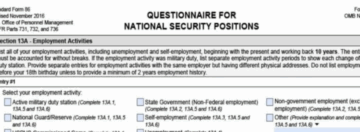The United Kingdom Security Clearance Vetting Process
The United Kingdom, one of our closest allies, conducts security vetting much in the same way as the U.S. does in granting security clearances, but there are some differences in terminology and level of inquiries. The Defense Business Services (DBS) National Security Vetting (NSV) branch is their equivalent of our Office of Personnel Management and carries out most of the national security vetting. The U.K. breaks down their security vetting into four main levels of Government security clearance:
Baseline Personnel Security Standard (BPSS) – The BPSS checks are normally performed when a person is first recruited and consists of verification of the following:
- Identity;
- Employment history (past three years);
- Nationality and Immigration Status;
- Criminal records checks
Counter-Terrorist Check (CTC) – required for individuals who are employed in posts similar to our Public Trust positions and include checks of the following:
- Completion of a security clearance questionnaire by the candidate;
- Checks against departmental/company records;
- Checks against UK criminal records covering both spent and unspent convictions;
- Checks against the Security Service (MI5) records;
- May also include an interview
Security Check (SC) – required for access to certain Government establishments and for jobs involving access to sensitive information which is classified as ‘SECRET’. The vetting process for SC clearance includes:
- Completion of a security clearance questionnaire by the candidate
- Checking identity documents and employment/education references
- Checks against UK criminal and security records
- Credit reference check;
- If considered necessary, checks against the criminal and security records of relevant foreign countries.
Developed Vetting (DV) is the most detailed and comprehensive form of UK vetting and is required for sensitive jobs and tasks which involve long-term, frequent or uncontrolled access to TOP SECRET material. The vetting process for DV clearance includes:
- SC clearance
- Completion of a DV supplementary questionnaire by the candidate
- Completion of a financial questionnaire by the candidate
- Review of the candidate’s personal finances;
- Interviews with a candidate’s references conducted by a vetting officer;
- Detailed interview with a candidate conducted by a vetting officer.
- *Note- The candidate must have been resident in the UK for the majority of the past ten years and have residency information that is verifiable.
As you can see, the processes between the U.S. and U.K. are quite similar and in some instances, a bit more stringent. It is no wonder that we have full confidence in sharing information with our cousins from across the pond.



Start the discussion